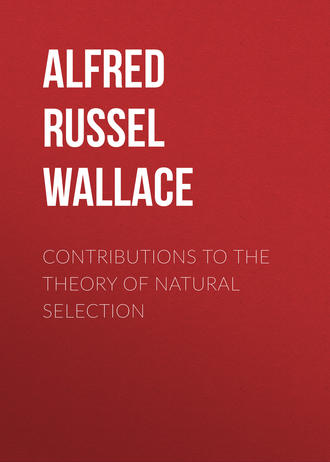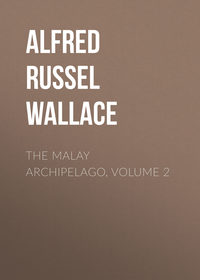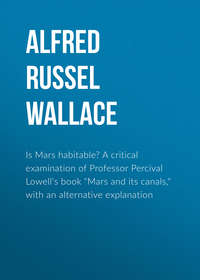 полная версия
полная версияContributions to the Theory of Natural Selection
The large island of Borneo, which contains more species of Papilionidæ than any other in the archipelago, has nevertheless only three peculiar to itself; and it is quite possible, and even probable, that one of these may be found in Sumatra or Java. The last-named island has also three species peculiar to it; Sumatra has not one, and the peninsula of Malacca only two. The identity of species is even greater than in birds or in most other groups of insects, and points very strongly to a recent connexion of the whole with each other and the continent.
Remarkable Peculiarities of the Island of Celebes
If we now pass to the next island (Celebes), separated from those last mentioned by a strait not wider than that which divides them from each other, we have a striking contrast; for with a total number of species less than either Borneo or Java, no fewer than eighteen are absolutely restricted to it. Further east, the large islands of Ceram and New Guinea have only three species peculiar to each, and Timor has five. We shall have to look, not to single islands, but to whole groups, in order to obtain an amount of individuality comparable with that of Celebes. For example, the extensive group comprising the large islands of Java, Borneo, and Sumatra, with the peninsula of Malacca, possessing altogether 48 species, has about 24, or just half, peculiar to it; the numerous group of the Philippines possess 22 species, of which 17 are peculiar; the seven chief islands of the Moluccas have 27, of which 12 are peculiar; and the whole of the Papuan Islands, with an equal number of species, have 17 peculiar. Comparable with the most isolated of these groups is Celebes, with its 24 species, of which the large proportion of 18 are peculiar. We see, therefore, that the opinion I have elsewhere expressed, of the high degree of isolation and the remarkable distinctive features of this interesting island, is fully borne out by the examination of this conspicuous family of insects. A single straggling island with a few small satellites, it is zoologically of equal importance with extensive groups of islands many times as large as itself; and standing in the very centre of the archipelago, surrounded on every side with islets connecting it with the larger groups, and which seem to afford the greatest facilities for the migration and intercommunication of their respective productions, it yet stands out conspicuous with a character of its own in every department of nature, and presents peculiarities which are, I believe, without a parallel in any similar locality on the globe.
Briefly to summarize these peculiarities, Celebes possesses three genera of mammals (out of the very small number which inhabit it) which are of singular and isolated forms, viz., Cynopithecus, a tailless Ape allied to the Baboons; Anoa, a straight-horned Antelope of obscure affinities, but quite unlike anything else in the whole archipelago or in India: and Babirusa, an altogether abnormal wild Pig. With a rather limited bird population, Celebes has an immense preponderance of species confined to it, and has also six remarkable genera (Meropogon, Ceycopsis, Streptocitta, Enodes, Scissirostrum, and Megacephalon) entirely restricted to its narrow limits, as well as two others (Prioniturus and Basilornis) which only range to a single island beyond it.
Mr. Smith’s elaborate tables of the distribution of Malayan Hymenoptera (see “Proc. Linn. Soc.” Zool. vol. vii.) show that out of the large number of 301 species collected in Celebes, 190 (or nearly two-thirds) are absolutely restricted to it, although Borneo on one side, and the various islands of the Moluccas on the other, were equally well explored by me; and no less than twelve of the genera are not found in any other island of the archipelago. I have shown in the present essay that, in the Papilionidæ, it has far more species of its own than any other island, and a greater proportion of peculiar species than many of the large groups of islands in the archipelago—and that it gives to a large number of the species and varieties which inhabit it, 1st, an increase of size, and, 2nd, a peculiar modification in the form of the wings, which stamp upon the most dissimilar insects a mark distinctive of their common birth-place.
What, I would ask, are we to do with phenomena such as these? Are we to rest content with that very simple, but at the same time very unsatisfying explanation, that all these insects and other animals were created exactly as they are, and originally placed exactly where they are, by the inscrutable will of their Creator, and that we have nothing to do but to register the facts and wonder? Was this single island selected for a fantastic display of creative power, merely to excite a childlike and unreasoning admiration? Is all this appearance of gradual modification by the action of natural causes—a modification the successive steps of which we can almost trace—all delusive? Is this harmony between the most diverse groups, all presenting analogous phenomena, and indicating a dependence upon physical changes of which we have independent evidence, all false testimony? If I could think so, the study of nature would have lost for me its greatest charm. I should feel as would the geologist, if you could convince him that his interpretation of the earth’s past history was all a delusion—that strata were never formed in the primeval ocean, and that the fossils he so carefully collects and studies are no true record of a former living world, but were all created just as they now are, and in the rocks where he now finds them.
I must here express my own belief that none of these phenomena, however apparently isolated or insignificant, can ever stand alone—that not the wing of a butterfly can change in form or vary in colour, except in harmony with, and as a part of the grand march of nature. I believe, therefore, that all the curious phenomena I have just recapitulated, are immediately dependent on the last series of changes, organic and inorganic, in these regions; and as the phenomena presented by the island of Celebes differ from those of all the surrounding islands, it can, I conceive, only be because the past history of Celebes has been, to some extent, unique and different from theirs. We must have much more evidence to determine exactly in what that difference has consisted. At present, I only see my way clear to one deduction, viz., that Celebes represents one of the oldest parts of the archipelago; that it has been formerly more completely isolated both from India and from Australia than it is now, and that amid all the mutations it has undergone, a relic or substratum of the fauna and flora of some more ancient land has been here preserved to us.
It is only since my return home, and since I have been able to compare the productions of Celebes side by side with those of the surrounding islands, that I have been fully impressed with their peculiarity, and the great interest that attaches to them. The plants and the reptiles are still almost unknown; and it is to be hoped that some enterprising naturalist may soon devote himself to their study. The geology of the country would also be well worth exploring, and its newer fossils would be of especial interest as elucidating the changes which have led to its present anomalous condition. This island stands, as it were, upon the boundary-line between two worlds. On one side is that ancient Australian fauna, which preserves to the present day the facies of an early geological epoch; on the other is the rich and varied fauna of Asia, which seems to contain, in every class and order, the most perfect and highly organised animals. Celebes has relations to both, yet strictly belongs to neither: it possesses characteristics which are altogether its own; and I am convinced that no single island upon the globe would so well repay a careful and detailed research into its past and present history.
Concluding Remarks
In writing this essay it has been my object to show how much may, under favourable circumstances, be learnt by the study of what may be termed the external physiology of a small group of animals, inhabiting a limited district. This branch of natural history had received little attention till Mr. Darwin showed how important an adjunct it may become towards a true interpretation of the history of organized beings, and attracted towards it some small share of that research which had before been almost exclusively devoted to internal structure and physiology. The nature of species, the laws of variation, the mysterious influence of locality on both form and colour, the phenomena of dimorphism and of mimicry, the modifying influence of sex, the general laws of geographical distribution, and the interpretation of past changes of the earth’s surface, have all been more or less fully illustrated by the very limited group of the Malayan Papilionidæ; while, at the same time, the deductions drawn therefrom have been shown to be supported by analogous facts, occurring in other and often widely-separated groups of animals.
V.
ON INSTINCT IN MAN AND ANIMALS
The most perfect and most striking examples of what is termed instinct, those in which reason or observation appear to have the least influence, and which seem to imply the possession of faculties farthest removed from our own, are to be found among insects. The marvellous constructive powers of bees and wasps, the social economy of ants, the careful provision for the safety of a progeny they are never to see manifested by many beetles and flies, and the curious preparations for the pupa state by the larvæ of butterflies and moths, are typical examples of this faculty, and are supposed to be conclusive as to the existence of some power or intelligence, very different from that which we derive from our senses or from our reason.
How Instinct may be best Studied
Whatever we may define instinct to be, it is evidently some form of mental manifestation, and as we can only judge of mind by the analogy of our own mental functions and by observation of the results of mental action in other men and in animals, it is incumbent on us, first, to study and endeavour to comprehend the minds of infants, of savage men, and of animals not very far removed from ourselves, before we pronounce positively as to the nature of the mental operations in creatures so radically different from us as insects. We have not yet even been able to ascertain what are the senses they possess, or what relation their powers of seeing, hearing, and feeling have to ours. Their sight may far exceed ours both in delicacy and in range, and may possibly give them knowledge of the internal constitution of bodies analogous to that which we obtain by the spectroscope; and that their visual organs do possess some powers which ours do not, is indicated by the extraordinary crystalline rods radiating from the optic ganglion to the facets of the compound eye, which rods vary in form and thickness in different parts of their length, and possess distinctive characters in each group of insects. This complex apparatus, so different from anything in the eyes of vertebrates, may subserve some function quite inconceivable by us, as well as that which we know as vision. There is reason to believe that insects appreciate sounds of extreme delicacy, and it is supposed that certain minute organs, plentifully supplied with nerves, and situated in the subcostal vein of the wing in most insects, are the organs of hearing. But besides these, the Orthoptera (such as grasshoppers, &c.) have what are supposed to be ears on their fore legs, and Mr. Lowne believes that the little stalked balls, which are the sole remnants of the hind wings in flies, are also organs of hearing or of some analogous sense. In flies, too, the third joint of the antennæ contains thousands of nerve-fibres, which terminate in small open cells, and this Mr. Lowne believes to be the organ of smell, or of some other, perhaps new, sense. It is quite evident, therefore, that insects may possess senses which give them a knowledge of that which we can never perceive, and enable them to perform acts which to us are incomprehensible. In the midst of this complete ignorance of their faculties and inner nature, is it wise for us to judge so boldly of their powers by a comparison with our own? How can we pretend to fathom the profound mystery of their mental nature, and decide what, and how much, they can perceive or remember, reason or reflect! To leap at one bound from our own consciousness to that of an insect’s, is as unreasonable and absurd as if, with a pretty good knowledge of the multiplication table, we were to go straight to the study of the calculus of functions, or as if our comparative anatomists should pass from the study of man’s bony structure to that of the fish, and, without any knowledge of the numerous intermediate forms, were to attempt to determine the homologies between these distant types of vertebrata. In such a case would not error be inevitable, and would not continued study in the same direction only render the erroneous conclusions more ingrained and more irremovable.
Definition of Instinct
Before going further into this subject, we must determine what we mean by the term instinct. It has been variously defined as—“disposition operating without the aid of instruction or experience,” “a mental power totally independent of organization,” or “a power enabling an animal to do that which, in those things man can do, results from a chain of reasoning, and in things which man cannot do, is not to be explained by any efforts of the intellectual faculties.” We find, too, that the word instinct is very frequently applied to acts which are evidently the result either of organization or of habit. The colt or calf is said to walk instinctively, almost as soon as it is born; but this is solely due to its organization, which renders walking both possible and pleasurable to it. So we are said instinctively to hold out our hands to save ourselves from falling, but this is an acquired habit, which the infant does not possess. It appears to me that instinct should be defined as—“the performance by an animal of complex acts, absolutely without instruction or previously-acquired knowledge.” Thus, acts are said to be performed by birds in building their nests, by bees in constructing their cells, and by many insects in providing for the future wants of themselves or their progeny, without ever having seen such acts performed by others, and without any knowledge of why they perform them themselves. This is expressed by the very common term “blind instinct.” But we have here a number of assertions of matters of fact, which, strange to say, have never been proved to be facts at all. They are thought to be so self-evident that they may be taken for granted. No one has ever yet obtained the eggs of some bird which builds an elaborate nest, hatched these eggs by steam or under a quite distinct parent, placed them afterwards in an extensive aviary or covered garden, where the situation and the materials of a nest similar to that of the parent birds may be found, and then seen what kind of nest these birds would build. If under these rigorous conditions they choose the same materials, the same situation, and construct the nest in the same way and as perfectly as their parents did, instinct would be proved in their case; now it is only assumed, and assumed, as I shall show further on, without any sufficient reason. So, no one has ever carefully taken the pupæ of a hive of bees out of the comb, removed them from the presence of other bees, and loosed them in a large conservatory with plenty of flowers and food, and observed what kind of cells they would construct. But till this is done, no one can say that bees build without instruction, no one can say that with every new swarm there are no bees older than those of the same year, who may be the teachers in forming the new comb. Now, in a scientific inquiry, a point which can be proved should not be assumed, and a totally unknown power should not be brought in to explain facts, when known powers may be sufficient. For both these reasons I decline to accept the theory of instinct in any case where all other possible modes of explanation have not been exhausted.
Does Man possess Instincts
Many of the upholders of the instinctive theory maintain, that man has instincts exactly of the same nature as those of animals, but more or less liable to be obscured by his reasoning powers; and as this is a case more open to our observation than any other, I will devote a few pages to its consideration. Infants are said to suck by instinct, and afterwards to walk by the same power, while in adult man the most prominent case of instinct is supposed to be, the powers possessed by savage races to find their way across a trackless and previously unknown wilderness. Let us take first the case of the infant’s sucking. It is sometimes absurdly stated that the new-born infant “seeks the breast,” and this is held to be a wonderful proof of instinct. No doubt it would be if true, but unfortunately for the theory it is totally false, as every nurse and medical man can testify. Still, the child undoubtedly sucks without teaching, but this is one of those simple acts dependent upon organization, which cannot properly be termed instinct, any more than breathing or muscular motion. Any object of suitable size in the mouth of an infant excites the nerves and muscles so as to produce the act of suction, and when at a little later period, the will comes into play, the pleasurable sensations consequent on the act lead to its continuance. So, walking is evidently dependent on the arrangement of the bones and joints, and the pleasurable exertion of the muscles, which lead to the vertical posture becoming gradually the most agreeable one; and there can be little doubt that an infant would learn of itself to walk, even if suckled by a wild beast.
How Indians travel through unknown and trackless Forests
Let us now consider the fact, of Indians finding their way through forests they have never traversed before. This is much misunderstood, for I believe it is only performed under such special conditions, as at once to show that instinct has nothing to do with it. A savage, it is true, can find his way through his native forests in a direction in which he has never traversed them before; but this is because from infancy he has been used to wander in them, and to find his way by indications which he has observed himself or learnt from others. Savages make long journeys in many directions, and, their whole faculties being directed to the subject, they gain a wide and accurate knowledge of the topography, not only of their own district, but of all the regions round about. Every one who has travelled in a new direction communicates his knowledge to those who have travelled less, and descriptions of routes and localities, and minute incidents of travel, form one of the main staples of conversation round the evening fire. Every wanderer or captive from another tribe adds to the store of information, and as the very existence of individuals and of whole families and tribes, depends upon the completeness of this knowledge, all the acute perceptive faculties of the adult savage are devoted to acquiring and perfecting it. The good hunter or warrior thus comes to know the bearing of every hill and mountain range, the directions and junctions of all the streams, the situation of each tract characterized by peculiar vegetation, not only within the area he has himself traversed, but for perhaps a hundred miles around it. His acute observation enables him to detect the slightest undulations of the surface, the various changes of subsoil and alterations in the character of the vegetation, that would be quite imperceptible to a stranger. His eye is always open to the direction in which he is going; the mossy side of trees, the presence of certain plants under the shade of rocks, the morning and evening flight of birds, are to him indications of direction, almost as sure as the sun in the heavens. Now, if such a savage is required to find his way across this country in a direction in which he has never been before, he is quite equal to the task. By however circuitous a route he has come to the point he is to start from, he has observed all the bearings and distances so well, that he knows pretty nearly where he is, the direction of his own home and that of the place he is required to go to. He starts towards it, and knows that by a certain time he must cross an upland or a river, that the streams should flow in a certain direction, and that he should cross some of them at a certain distance from their sources. The nature of the soil throughout the whole region is known to him, as well as all the great features of the vegetation. As he approaches any tract of country he has been in or near before, many minute indications guide him, but he observes them so cautiously that his white companions cannot perceive by what he has directed his course. Every now and then he slightly changes his direction, but he is never confused, never loses himself, for he always feels at home; till at last he arrives at a well-known country, and directs his course so as to reach the exact spot desired. To the Europeans whom he guides, he seems to have come without trouble, without any special observation, and in a nearly straight unchanging course. They are astonished, and ask if he has ever been the same route before, and when he answers “No,” conclude that some unerring instinct could alone have guided him. But take this same man into another country very similar to his own, but with other streams and hills, another kind of soil, with a somewhat different vegetation and animal life; and after bringing him by a circuitous route to a given point, ask him to return to his starting place, by a straight line of fifty miles through the forest, and he will certainly decline to attempt it, or, attempting it, will more or less completely fail. His supposed instinct does not act out of his own country.
A savage, even in a new country, has, however, undoubted advantages, from his familiarity with forest life, his entire fearlessness of being lost, his accurate perception of direction and of distance, and he is thus able very soon to acquire a knowledge of the district that seems marvellous to a civilized man; but my own observation of savages in forest countries has convinced me, that they find their way by the use of no other faculties than those which we ourselves possess. It appears to me, therefore, that to call in the aid of a new and mysterious power to account for savages being able to do that which, under similar conditions, we could almost all of us perform, although perhaps less perfectly, is almost ludicrously unnecessary.
In the next essay I shall attempt to show, that much of what has been attributed to instinct in birds, can be also very well explained by crediting them with those faculties of observation, memory, and imitation, and with that limited amount of reason, which they undoubtedly exhibit.
VI.
THE PHILOSOPHY OF BIRDS’ NESTS
Instinct or Reason in the Construction of Birds’ Nests
Birds, we are told, build their nests by instinct, while man constructs his dwelling by the exercise of reason. Birds never change, but continue to build for ever on the self-same plan; man alters and improves his houses continually. Reason advances; instinct is stationary.
This doctrine is so very general that it may almost be said to be universally adopted. Men who agree on nothing else, accept this as a good explanation of the facts. Philosophers and poets, metaphysicians and divines, naturalists and the general public, not only agree in believing this to be probable, but even adopt it as a sort of axiom that is so self-evident as to need no proof, and use it as the very foundation of their speculations on instinct and reason. A belief so general, one would think, must rest on indisputable facts, and be a logical deduction from them. Yet I have come to the conclusion that not only is it very doubtful, but absolutely erroneous; that it not only deviates widely from the truth, but is in almost every particular exactly opposed to it. I believe, in short, that birds do not build their nests by instinct; that man does not construct his dwelling by reason; that birds do change and improve when affected by the same causes that make men do so; and that mankind neither alter nor improve when they exist under conditions similar to those which are almost universal among birds.









